- Home
- Ann M. Martin
Home Is the Place Page 5
Home Is the Place Read online
Page 5
“What?!”
“You heard me. That’s the end of the discussion. Go to your room until dinnertime.”
Georgia marched into her room and slammed the door behind her. “It was just a mistake!” she shouted. “It was a misunderstanding. Just because I’m the responsible one, I’m the one who gets punished! You expect more from me. You never punish Richard, but you punish me all the time. I’m the one who gets the good grades, I’m the one who cleans my room and does my chores and practices my guitar. I do everything right, and then when the littlest thing goes wrong, I get punished. It isn’t fair.” Georgia held her ear to her door and listened for sounds from the living room. When she heard only the clacking of the keys on her mother’s laptop, she shouted again, “It isn’t fair!”
Georgia rolled over in the unfamiliar bed in the unfamiliar room. The first thing she saw was her mother sleeping in a matching bed beside her. She tiptoed to the window, quietly raised the venetian blind, and blinked in the sunlight. Below her was the world of West 73rd Street in Manhattan. She knew that if she could crane her head far enough to the right she’d be able to see West End Avenue. Georgia peeked at her watch. Seven thirty. Seven thirty on a Saturday morning and already the city was busy. Taxis glided by. A man hurried along walking three tiny white dogs on leashes that glittered. Each dog carried a toy in its mouth, and the man carried a brown paper bag in his free hand. A woman pushed a stroller with two screaming children in it. Even from the fourth floor Georgia could hear their shrieks. The woman checked her cell phone and ignored the noise.
Georgia turned from the window and crept back to her bed. She lay there, smiling, recalling the events — they still seemed surreal to her — that had brought her to Nana Dana’s apartment for a weekend in Manhattan, and what she hoped was the beginning of her professional music career.
Her adventure had begun just over a month earlier when, at the end of band practice at Barnegat Point Elementary one afternoon, Mr. Elden had crooked his finger at Georgia and said, “Could you stay for a few minutes, please? I need to talk to you about something.”
Ava, who played keyboard in the band, had raised her eyebrows at Georgia and whispered ever so softly, “Woo-hoo.” All the students at BP Elementary thought Mr. Elden was cool, even though he was middle-aged — older than Georgia’s own parents — and his hair was turning gray.
“Have you ever seen him perform?” Talia had asked Georgia one day. “He plays guitar in a band on weekends. Like in restaurants and clubs and stuff. He plays electric guitar. He looks like a TV star then, not like a teacher.” She had added rapturously, as most of the girls did when the subject of Mr. Elden came up, “He is SO AWESOME.”
Georgia hadn’t seen him play except when he was giving lessons, but she agreed that he was awesome. Now, as he motioned to her to stay behind after class, Georgia flashed Ava a self-conscious smile and returned to her seat.
“So,” said Mr. Elden, when the room had emptied. He perched on his desk in the cramped practice space. “I have an opportunity for you.”
Georgia looked at him with interest. “An opportunity?”
“I have a friend in the business —” He noticed the confusion on Georgia’s face and said, “The music business. He’s based in New York and he’s looking for a kid to perform in a piece to promote a music video.”
“Yes?” said Georgia, willing herself not to get too excited.
“I thought of you right away. You’re my most talented guitar student. You play way beyond your level, and you’re already creating your own style. Would you be interested in performing in the video? The piece will be very short, but it would be nice exposure for you.”
Georgia could contain herself no longer. She jumped out of her chair. “Yes! Yes, I would love that! It would be so exciting!”
Mr. Elden grinned. “Excellent. I hoped that would be your response. A few things, though. We’ll need to send Joe — he’s my friend — some footage of you playing your guitar. We’ll need to put together something that will show off your strengths and your range. Also, the piece is going to be shot in New York City, so you and I and one of your parents will have to travel there.”
Georgia had begun babbling then — about her dream of becoming a professional guitar player, about Nana Dana and her apartment in Manhattan, and about how this opportunity was a dream come true. What she didn’t say was that she couldn’t imagine her mother okaying a trip to NYC with Mr. Elden.
Mr. Elden put out a hand to slow her down. “Go home, talk to your parents, and then ask one of them to call me. We’ll take it from there.”
At home that evening, Georgia had waited until her house was quiet and homework time was underway (although Richard, she knew, was under his covers with his Nintendo, not his math book).
“Mom? Dad?” said Georgia, standing uncertainly in the living room where her parents were huddled over bank statements and record books. Her father was still the owner of A Doll’s House, since the store had picked up slightly — ever so slightly — by the end of the previous summer, but the holidays had been disastrous. “Can I talk to you?”
“Sure. What’s up, Georgie Girl?” her father replied vaguely.
“It’s sort of important.”
Her parents put the papers away and gave Georgia their full attention. She sat across from them and reported everything that Mr. Elden had told her. She tried to sound serious and grown-up.
Mr. Noble’s eyes had brightened and he’d taken his daughter’s hand and exclaimed, “Honey, that’s wonderful! This really is an opportunity. I’ll call Mr. Elden right away.”
But Mrs. Noble had grown serious. She pursed her lips together, threw her husband a venomous look, and said, “Sorry, Georgia, but that’s out of the question.”
“Mom, please, I really want to go. And Dad agreed that this is an opportunity.”
“But a trip to New York? To be filmed by some music business person we don’t even know?”
“We could stay at Nana Dana’s,” said Georgia. “We’ve done that before. We’d be safe there. And Nana Dana could spend the day with us. She wouldn’t let anything happen. We’d be safe. Please.”
Her mom shook her head. “Out of the question.”
But Georgia’s father got to his feet. “I’m sorry. Not this time.”
Georgia and her mother both looked up at him in confusion.
Mr. Noble turned to his wife. “You are not making this decision by yourself. You do not have the only say in the matter. There are three of us here, and we all get a vote. This is important to Georgia, and she’s being very mature about it. I vote that Georgia be allowed to take the opportunity. Georgia?”
“I vote yes, too,” said Georgia, practically holding her breath.
“Well, I vote no,” said her mother. “But I guess that doesn’t matter.”
Georgia had thrown her arms around her father. “Oh, thank you, thank you, thank you!” she’d cried. “You know, I still might not get to go. I still have to send in a DVD, but thank you for saying I can try.”
* * *
Georgia had gotten to go, of course. It hadn’t been easy. Putting together a DVD that showed off all the skills Mr. Elden thought were important, as well as her technique and style, was far more complicated and time-consuming than Georgia had imagined it would be. She’d worked hard, though, both at home on her own and during her lessons with Mr. Elden. Within an hour of viewing the DVD, Mr. Elden’s friend had announced that he wanted Georgia for the video.
And so the planning had begun. After much discussion among the adults, including Nana Dana in New York, it was decided that Georgia and her mother would go to Manhattan for a girls’ weekend with Nana Dana. The “shoot,” as Georgia had learned the filming of the video was called, would take place on a Saturday afternoon. Georgia, Mrs. Noble, and Mr. Elden would leave for New York on Friday. (“You mean she gets a day off school?” Richard had exclaimed, incensed.) They would return on Sunday.
“Let’s jus
t hope we’re all in one piece,” Mrs. Noble said more than once.
* * *
Now it was Saturday morning, the day of the shoot. Georgia glanced at her mother, who was still asleep, crept into the hallway of Nana Dana’s apartment, and tiptoed into the living room.
“Hi, pumpkin,” said Nana Dana. She was sitting on the couch with a cup of coffee, which she set down. She opened her arms and Georgia settled into them.
“I saw a man walking three dogs on sparkle leashes,” Georgia said into her grandmother’s shoulder. Then she added, “Mom is still asleep.”
Nana Dana held Georgia at arm’s length. “So? Are you excited?”
Georgia nodded. “About the video and also just about being here.”
“In New York?”
“In New York with you.”
Nana Dana smiled. “When your mother was little she used to love visiting New York.”
Georgia widened her eyes. “Really? She did?” She couldn’t imagine her mother loving trips to the big bad city.
“Really and truly. She and her father and I would come here for weekends to visit my aunt Adele and your mother would stay with Adele in her apartment. We would go to shows and out to dinner and walk all over the city.”
“I wish I lived closer to you,” said Georgia, “so we could do things like that.”
“Me, too, pumpkin.” Nana Dana drew Georgia in for another hug.
* * *
At exactly noon, Georgia, her mother, and Nana Dana met Mr. Elden at the entrance to Central Park. With Mr. Elden was a tall man wearing jeans and a leather jacket. The eyes behind his thick black glasses looked stern, but when Mr. Elden said, “Joe, this is Georgia, our star guitar player,” Joe smiled warmly.
“Let’s get to work,” he said.
With Joe were two men lugging cameras, microphones, and all sorts of equipment stored in heavy black cases that they toted much more cheerfully than Georgia would have.
“First,” Joe said to Georgia, “we want to shoot you” (“Shoot me?!” Georgia couldn’t help thinking) “walking through the park playing your guitar.”
Georgia hadn’t expected this. She was used to sitting and playing, or occasionally standing and playing. But she gamely slung her guitar strap over her shoulder and, following Joe’s directions, began walking along a path in the park, playing “Yesterday” by the Beatles. She was acutely aware of the stares of passersby. It was a chilly, bright Saturday, and even though the weather couldn’t be described as springlike, the park was a lively place. Vendors sold hot pretzels and sodas. Children flew along the paths on Rollerblades and scooters, their nervous parents running after them. A karate class was in progress on the lawn. But as Georgia strummed her way through the park — surrounded by Joe and his crew, Mr. Elden, her mother, and Nana Dana — everyone stopped to watch her. She tried to smile at them as she played. She had a feeling she was grimacing instead, but when she glanced self-consciously at Joe, he simply motioned to her to keep going.
After forty-five minutes of walking and playing, Joe finally said, “Okay, that’s good! Now we’re going to move on to Times Square.”
Georgia turned to her mother, astounded, and whispered, “I thought we were done!”
They were far from done. “We need lots of footage,” Joe explained.
“How long is the video going to be?” asked Georgia.
“Five minutes.”
“Five minutes?!”
Joe laughed. “Welcome to show business. You can shoot for hours just to get five minutes of screen time.”
After playing her guitar in the middle of Times Square with what felt like ten million people staring at her, Joe wanted Georgia to play on a street corner with Madison Square Garden behind her, and then strolling through Grand Central Station.
When at last they emerged from the train station, darkness had fallen. Joe turned to Georgia, who felt as if she could fall asleep right there on the sidewalk in the middle of Manhattan, and said, “Georgia, you were wonderful. We’ll get you a copy of the video as soon as it’s finished.”
Georgia said good-bye to Mr. Elden then, and she and her mother and Nana Dana rode back uptown in a cab, Georgia half-asleep. But she woke up fully when her mother put her arm around her shoulder and whispered, “Honey, you were amazing. I’m proud of you.”
Nana Dana added, “You really have to come to the city more often. Both of you.”
Dana Goldberg had three grandchildren, but she still couldn’t get used to being a nana. Or to being called Nana Dana. Her only child, her daughter Francie, had called her Dana, never Mom, yet somehow Dana was now Nana. She didn’t feel like a grandmother. She had turned fifty-seven on her last birthday, an age that, when she was six, had seemed positively ancient. But now, well, Dana had one friend her age whose son had just graduated from high school. He was only eighteen. So fifty-seven wasn’t terribly old, was it?
Dana looked around the small art studio at the back of her apartment. It was nowhere near the size of the studio she used to have when she and Matthew and Francie had lived in the house on Vandeventer Avenue in Princeton. But she no longer needed so much space. She illustrated fewer books and took on less work these days (her choice). She was tired of deadlines and of getting up at 5:00 a.m. Not that she couldn’t handle those things. She just chose not to.
“I’m also not going to work on Sundays anymore,” she said aloud. She closed the door to the studio, walked down the hall to the kitchen, made a cup of coffee, and carried it to the living room. She sat in the armchair, the somewhat raggedy one that had made its way from Vandeventer to the smaller house in Princeton after her divorce from Matthew, and finally to this apartment in New York, where Dana hoped to live until she died. After a childhood spent moving around with her restless mother, Dana did not intend to move ever again.
She was reaching for the Sunday New York Times and considering cranking up the air conditioner when her phone rang. Dana reached for it and checked the caller ID. Maine, her daughter Francie’s number.
“Hi, honey!” Dana said brightly, a greeting that would be appropriate for any member of the Noble family.
“Nana Dana! Guess what!” It was Georgia’s excited voice.
“What?”
“I just the saw the video! The one we shot in New York. Mr. Elden — remember him? — emailed me a copy. He said I’ll have actual DVDs soon, so I’ll send you one. You can see it on your DVD player, since I know you don’t really understand your computer. I mean, not that you’re … It’s just that you’re sort of old-fashioned…. I mean …”
Dana laughed. “That’s okay. I am old-fashioned. You know me and email. I can’t wait to have the DVD.”
“Nana Dana, this is so exciting! I look professional. Although … I’m not the only kid in the video. I guess they filmed other kids some other time and then put the whole thing together. But anyway, it’s really cool.”
“Honey, that’s wonderful. You’re a star.”
“Yeah. Well, a star who’s grounded.”
“What?”
“Mom grounded me yesterday. It was so unfair!”
“Tell me what happened.”
Georgia sighed loudly. “I didn’t do anything.”
“But what happened?”
Another sigh. “You know my friends Talia and Ava?”
“Yes.”
“Well, their mother said they could ride their bikes to Barnegat Point by themselves. No adult. They asked me to go with them, but Mom said no, and I said Talia and Ava had permission, and Mom said, ‘Talia and Ava aren’t my daughters,’ and I said, ‘I’m three months older than Talia and five months older than Ava,’ and Mom said something about everyone jumping off a cliff, and then I went to my room and slammed the door and Mom grounded me. Even though Richard is just one year older than me and he’s allowed to ride to Barnegat Point without an adult.”
Dana closed her eyes briefly. At last she said, “I’m sorry, honey. It’s no fun being grounded during summer v
acation. At least you have your guitar.”
“Yeah. You want to hear the song I’m writing? It starts, ‘Why did you give birth to me / just to torture me?’ Only I don’t know what rhymes with ‘torture me’ so I’m a little stuck.” Georgia paused. “Did you know there’s no word that rhymes with orange?”
Dana settled back into the armchair, smiling. Mothers and daughters were the same in every generation, she supposed. The mothers were unfair and the daughters rebelled. Dana had rebelled against her own mother, and slowly she and Abby had grown apart. Even after Dana had grown up, even after she had become a mother and then a grandmother, she and Abby had maintained a wary distance.
I should call her, Dana thought, as she listened to Georgia. I should call my mother and apologize.
The list of things for which she should apologize was long. Very long. Going all the way back to the night on the Staten Island Ferry when Dana’s father, after an evening involving way too much drinking, had tried to capture his hat as the wind plucked it from his head and sent it sailing out over the bay. He had lunged for it, and Dana had lunged for him. But her father hadn’t been able to rescue his hat, and Dana hadn’t been able to rescue her father.
She hadn’t blamed him, though. Instead she had blamed her mother, who had been throwing up in the ferry’s restroom. If her mother had been sober, she would have been at Dana’s side and surely the two of them could have pulled her father back. That was what Dana had thought on that unforgettable night, and for weeks afterward. Her mother, who had nagged her husband endlessly about his drinking, had been drunk herself the one time he most needed her.
Then Abby had revealed to Dana and her brother and sister that she was pregnant. Another baby was on the way.
Pregnant.
Abby hadn’t been drunk the night of the accident. She’d been ill, with round-the-clock morning sickness.
And I blamed her, Dana thought. For weeks I blamed her for something unthinkable.
She should have asked her mother why she was sick, but instead she had silently assumed the worst.

 Karen's Tea Party
Karen's Tea Party Kristy and the Snobs
Kristy and the Snobs Best Kept Secret
Best Kept Secret Karen's Kittens
Karen's Kittens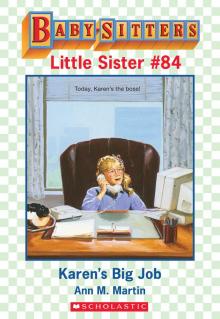 Karen's Big Job
Karen's Big Job Claudia and the Genius of Elm Street
Claudia and the Genius of Elm Street The Fire at Mary Anne's House
The Fire at Mary Anne's House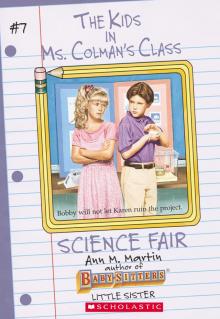 Science Fair
Science Fair Me and Katie (The Pest)
Me and Katie (The Pest) Karen's Plane Trip
Karen's Plane Trip Jessi's Wish
Jessi's Wish Dawn and Too Many Sitters
Dawn and Too Many Sitters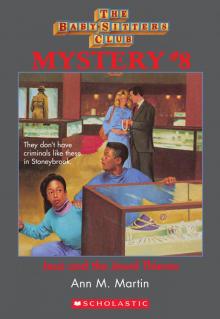 Jessi and the Jewel Thieves
Jessi and the Jewel Thieves Eleven Kids, One Summer
Eleven Kids, One Summer Karen's Goldfish
Karen's Goldfish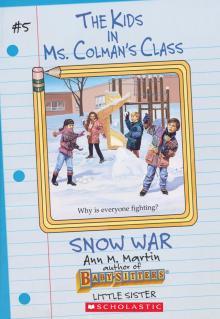 Snow War
Snow War Abby and the Secret Society
Abby and the Secret Society Keeping Secrets
Keeping Secrets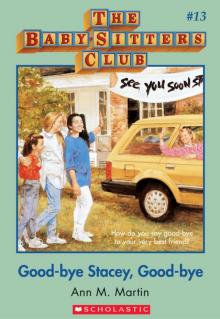 Good-Bye Stacey, Good-Bye
Good-Bye Stacey, Good-Bye Karen's Sleepover
Karen's Sleepover Claudia and the World's Cutest Baby
Claudia and the World's Cutest Baby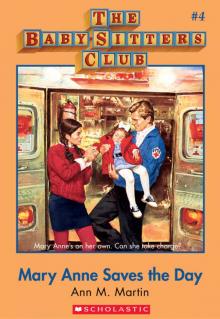 Mary Anne Saves the Day
Mary Anne Saves the Day Mallory and the Dream Horse
Mallory and the Dream Horse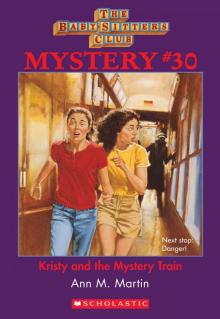 Kristy and the Mystery Train
Kristy and the Mystery Train Dawn's Family Feud
Dawn's Family Feud Karen's Twin
Karen's Twin Little Miss Stoneybrook... And Dawn
Little Miss Stoneybrook... And Dawn Karen's Mistake
Karen's Mistake Karen's Movie Star
Karen's Movie Star Mallory and the Mystery Diary
Mallory and the Mystery Diary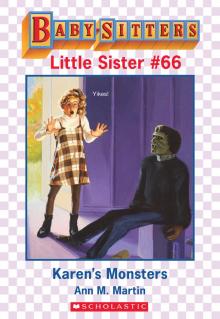 Karen's Monsters
Karen's Monsters Kristy + Bart = ?
Kristy + Bart = ? Karen's Dinosaur
Karen's Dinosaur Here Today
Here Today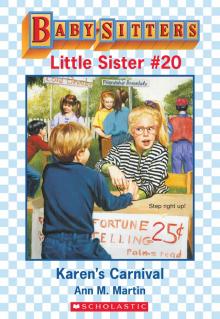 Karen's Carnival
Karen's Carnival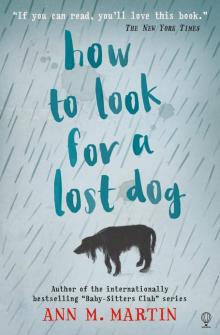 How to Look for a Lost Dog
How to Look for a Lost Dog Stacey vs. Claudia
Stacey vs. Claudia Stacey's Ex-Boyfriend
Stacey's Ex-Boyfriend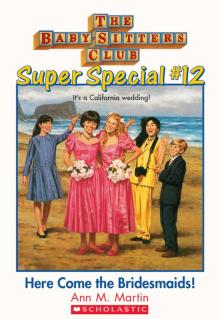 Here Come the Bridesmaids!
Here Come the Bridesmaids! Graduation Day
Graduation Day Kristy's Big News
Kristy's Big News Karen's School Surprise
Karen's School Surprise Kristy Thomas, Dog Trainer
Kristy Thomas, Dog Trainer Baby-Sitters' Christmas Chiller
Baby-Sitters' Christmas Chiller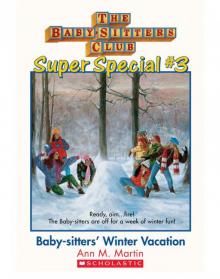 Baby-Sitters' Winter Vacation
Baby-Sitters' Winter Vacation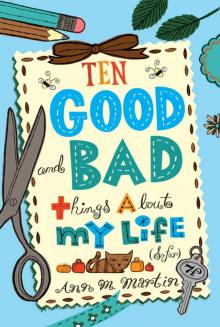 Ten Good and Bad Things About My Life
Ten Good and Bad Things About My Life Claudia and the Bad Joke
Claudia and the Bad Joke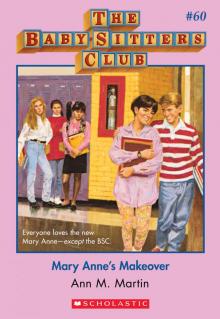 Mary Anne's Makeover
Mary Anne's Makeover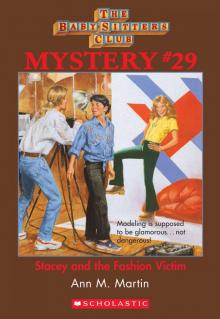 Stacey and the Fashion Victim
Stacey and the Fashion Victim Dawn Schafer, Undercover Baby-Sitter
Dawn Schafer, Undercover Baby-Sitter Karen's Tuba
Karen's Tuba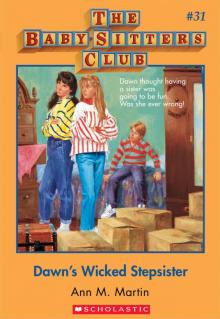 Dawn's Wicked Stepsister
Dawn's Wicked Stepsister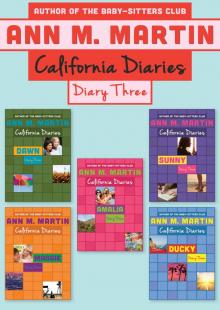 Diary Three: Dawn, Sunny, Maggie, Amalia, and Ducky
Diary Three: Dawn, Sunny, Maggie, Amalia, and Ducky Karen's Nanny
Karen's Nanny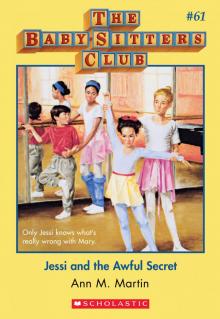 Jessi and the Awful Secret
Jessi and the Awful Secret Karen's New Year
Karen's New Year Karen's Candy
Karen's Candy Karen's President
Karen's President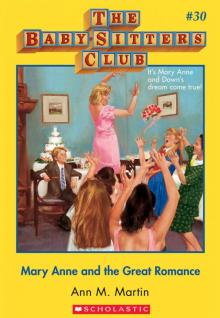 Mary Anne and the Great Romance
Mary Anne and the Great Romance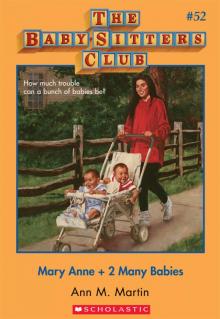 Mary Anne + 2 Many Babies
Mary Anne + 2 Many Babies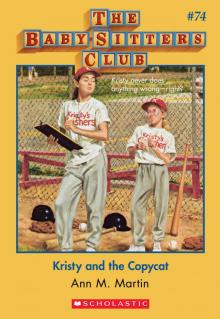 Kristy and the Copycat
Kristy and the Copycat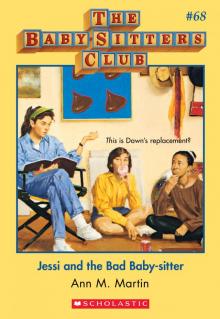 Jessi and the Bad Baby-Sitter
Jessi and the Bad Baby-Sitter Claudia, Queen of the Seventh Grade
Claudia, Queen of the Seventh Grade Claudia and the Lighthouse Ghost
Claudia and the Lighthouse Ghost Karen's New Puppy
Karen's New Puppy Karen's Home Run
Karen's Home Run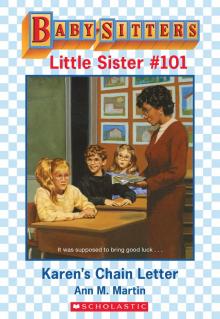 Karen's Chain Letter
Karen's Chain Letter Kristy in Charge
Kristy in Charge Karen's Angel
Karen's Angel Mary Anne and Too Many Boys
Mary Anne and Too Many Boys Karen's Big Fight
Karen's Big Fight Karen's Spy Mystery
Karen's Spy Mystery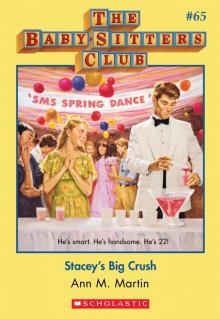 Stacey's Big Crush
Stacey's Big Crush Karen's School
Karen's School Claudia and the Terrible Truth
Claudia and the Terrible Truth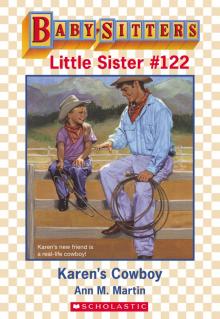 Karen's Cowboy
Karen's Cowboy The Summer Before
The Summer Before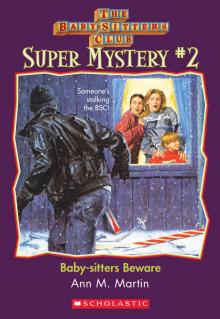 Beware, Dawn!
Beware, Dawn! Belle Teale
Belle Teale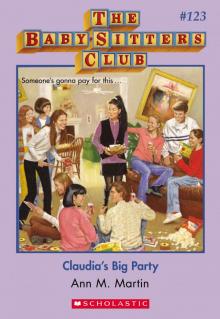 Claudia's Big Party
Claudia's Big Party The Secret Life of Mary Anne Spier
The Secret Life of Mary Anne Spier Karen's Book
Karen's Book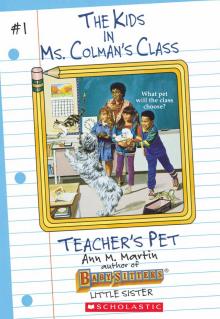 Teacher's Pet
Teacher's Pet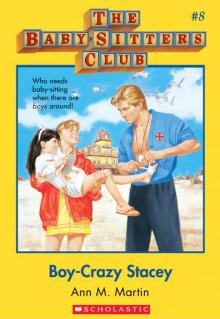 Boy-Crazy Stacey
Boy-Crazy Stacey Claudia and the Disaster Date
Claudia and the Disaster Date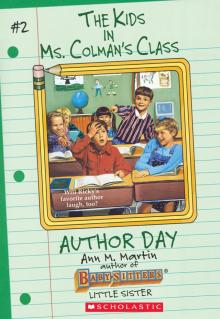 Author Day
Author Day Claudia and the Sad Good-Bye
Claudia and the Sad Good-Bye Kristy and the Worst Kid Ever
Kristy and the Worst Kid Ever Yours Turly, Shirley
Yours Turly, Shirley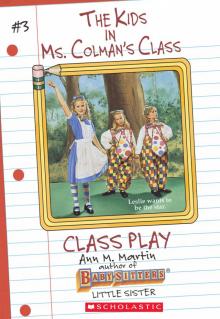 Class Play
Class Play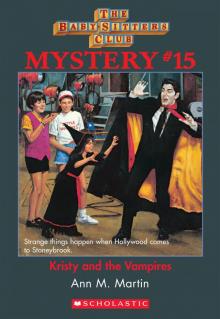 Kristy and the Vampires
Kristy and the Vampires Kristy and the Cat Burglar
Kristy and the Cat Burglar Karen's Pumpkin Patch
Karen's Pumpkin Patch Stacey and the Mystery at the Empty House
Stacey and the Mystery at the Empty House Karen's Chicken Pox
Karen's Chicken Pox Mary Anne and the Playground Fight
Mary Anne and the Playground Fight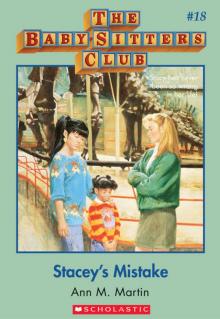 Stacey's Mistake
Stacey's Mistake Coming Apart
Coming Apart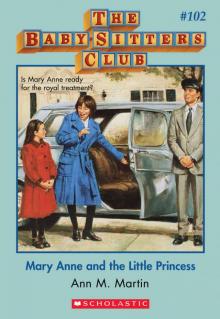 Mary Anne and the Little Princess
Mary Anne and the Little Princess Karen, Hannie and Nancy: The Three Musketeers
Karen, Hannie and Nancy: The Three Musketeers 'Tis the Season
'Tis the Season Claudia and Mean Janine
Claudia and Mean Janine Karen's School Bus
Karen's School Bus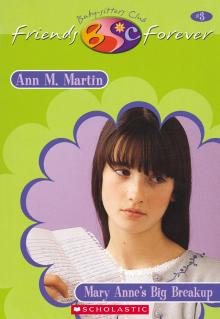 Mary Anne's Big Breakup
Mary Anne's Big Breakup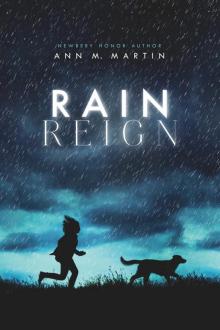 Rain Reign
Rain Reign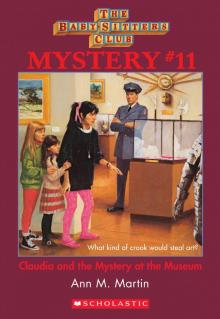 Claudia and the Mystery at the Museum
Claudia and the Mystery at the Museum Claudia and the Great Search
Claudia and the Great Search Karen's Doll
Karen's Doll Shannon's Story
Shannon's Story Sea City, Here We Come!
Sea City, Here We Come! Stacey and the Mystery of Stoneybrook
Stacey and the Mystery of Stoneybrook Karen's Treasure
Karen's Treasure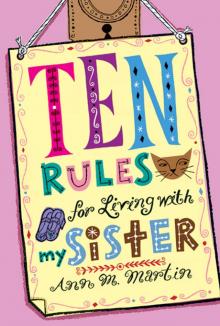 Ten Rules for Living With My Sister
Ten Rules for Living With My Sister With You and Without You
With You and Without You Baby-Sitters' Island Adventure
Baby-Sitters' Island Adventure Karen's Fishing Trip
Karen's Fishing Trip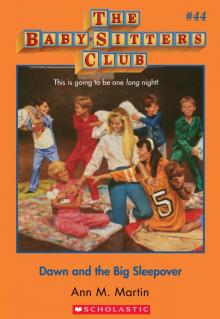 Dawn and the Big Sleepover
Dawn and the Big Sleepover New York, New York!
New York, New York! Ten Kids, No Pets
Ten Kids, No Pets Happy Holidays, Jessi
Happy Holidays, Jessi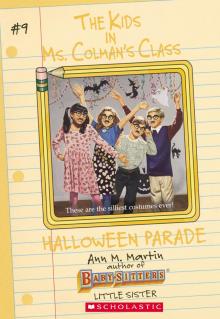 Halloween Parade
Halloween Parade Karen's New Holiday
Karen's New Holiday Kristy Power!
Kristy Power! Karen's Wish
Karen's Wish Claudia and the Mystery in the Painting
Claudia and the Mystery in the Painting Karen's Stepmother
Karen's Stepmother Abby in Wonderland
Abby in Wonderland Karen's Snow Day
Karen's Snow Day Kristy and the Secret of Susan
Kristy and the Secret of Susan Karen's Pony Camp
Karen's Pony Camp Karen's School Trip
Karen's School Trip Mary Anne to the Rescue
Mary Anne to the Rescue Karen's Unicorn
Karen's Unicorn Abby and the Notorious Neighbor
Abby and the Notorious Neighbor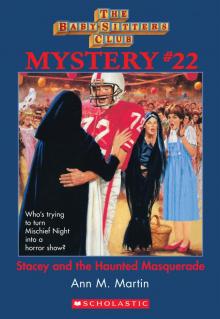 Stacey and the Haunted Masquerade
Stacey and the Haunted Masquerade Claudia Gets Her Guy
Claudia Gets Her Guy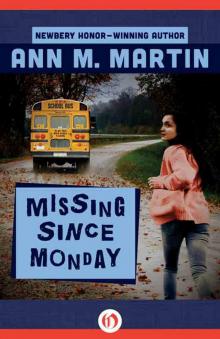 Missing Since Monday
Missing Since Monday Stacey's Choice
Stacey's Choice Stacey's Ex-Best Friend
Stacey's Ex-Best Friend Karen's New Teacher
Karen's New Teacher Karen's Accident
Karen's Accident Karen's Lucky Penny
Karen's Lucky Penny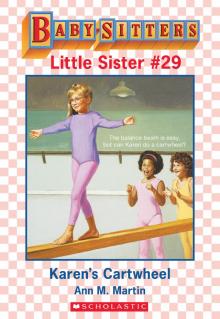 Karen's Cartwheel
Karen's Cartwheel Karen's Puppet Show
Karen's Puppet Show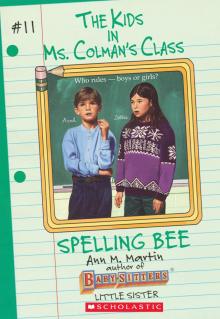 Spelling Bee
Spelling Bee Stacey's Problem
Stacey's Problem Stacey and the Stolen Hearts
Stacey and the Stolen Hearts Karen's Surprise
Karen's Surprise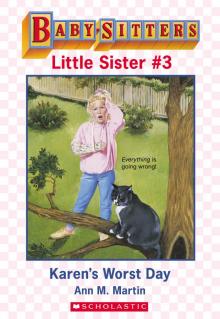 Karen's Worst Day
Karen's Worst Day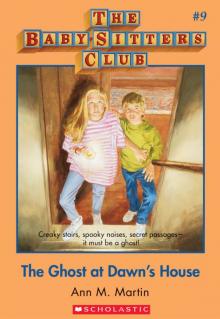 The Ghost at Dawn's House
The Ghost at Dawn's House Karen's Big Sister
Karen's Big Sister Karen's Easter Parade
Karen's Easter Parade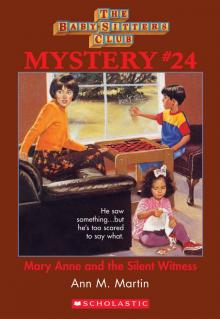 Mary Anne and the Silent Witness
Mary Anne and the Silent Witness Karen's Swim Meet
Karen's Swim Meet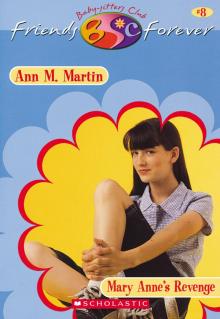 Mary Anne's Revenge
Mary Anne's Revenge Karen's Mystery
Karen's Mystery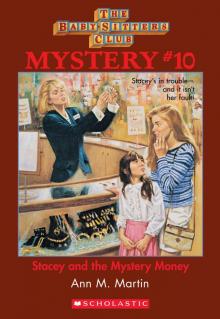 Stacey and the Mystery Money
Stacey and the Mystery Money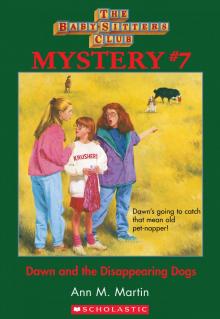 Dawn and the Disappearing Dogs
Dawn and the Disappearing Dogs Karen's Christmas Tree
Karen's Christmas Tree Welcome to Camden Falls
Welcome to Camden Falls Karen's Pilgrim
Karen's Pilgrim Dawn and the Halloween Mystery
Dawn and the Halloween Mystery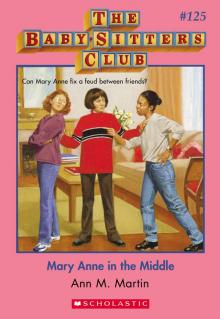 Mary Anne in the Middle
Mary Anne in the Middle Karen's Toys
Karen's Toys Kristy's Great Idea
Kristy's Great Idea Claudia and the Middle School Mystery
Claudia and the Middle School Mystery Karen's Big Weekend
Karen's Big Weekend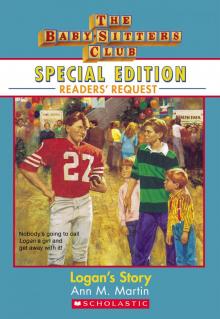 Logan's Story
Logan's Story Karen's Yo-Yo
Karen's Yo-Yo Kristy's Book
Kristy's Book Mallory and the Ghost Cat
Mallory and the Ghost Cat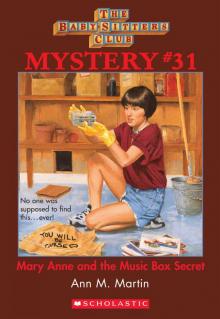 Mary Anne and the Music
Mary Anne and the Music Karen's Tattletale
Karen's Tattletale Karen's County Fair
Karen's County Fair Karen's Mermaid
Karen's Mermaid Snowbound
Snowbound Karen's Movie
Karen's Movie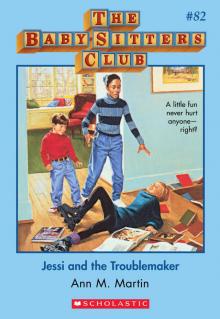 Jessi and the Troublemaker
Jessi and the Troublemaker Baby-Sitters at Shadow Lake
Baby-Sitters at Shadow Lake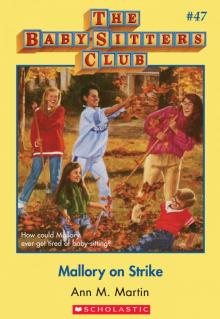 Mallory on Strike
Mallory on Strike Jessi's Baby-Sitter
Jessi's Baby-Sitter Karen's Leprechaun
Karen's Leprechaun Claudia and the Phantom Phone Calls
Claudia and the Phantom Phone Calls Karen's Good-Bye
Karen's Good-Bye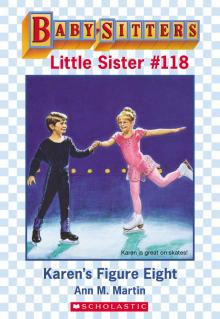 Karen's Figure Eight
Karen's Figure Eight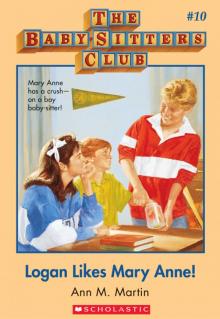 Logan Likes Mary Anne!
Logan Likes Mary Anne! Mary Anne and the Zoo Mystery
Mary Anne and the Zoo Mystery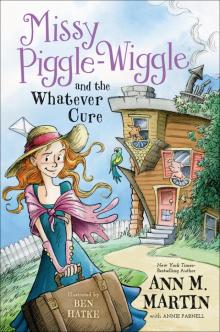 Missy Piggle-Wiggle and the Whatever Cure
Missy Piggle-Wiggle and the Whatever Cure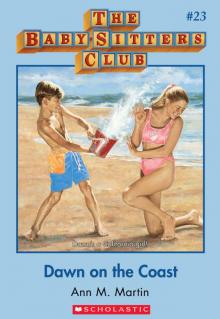 Dawn on the Coast
Dawn on the Coast Stacey and the Cheerleaders
Stacey and the Cheerleaders Claudia and the Clue in the Photograph
Claudia and the Clue in the Photograph Karen's New Friend
Karen's New Friend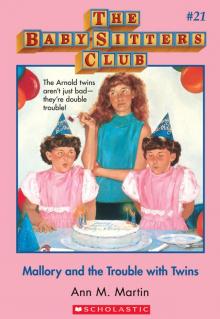 Mallory and the Trouble With Twins
Mallory and the Trouble With Twins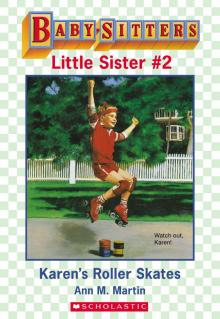 Karen's Roller Skates
Karen's Roller Skates Abby and the Best Kid Ever
Abby and the Best Kid Ever Poor Mallory!
Poor Mallory! Karen's Witch
Karen's Witch Karen's Grandmothers
Karen's Grandmothers Slam Book
Slam Book Karen's School Picture
Karen's School Picture Karen's Reindeer
Karen's Reindeer Kristy's Big Day
Kristy's Big Day The Long Way Home
The Long Way Home Karen's Sleigh Ride
Karen's Sleigh Ride On Christmas Eve
On Christmas Eve Karen's Copycat
Karen's Copycat Karen's Ice Skates
Karen's Ice Skates Claudia and the Little Liar
Claudia and the Little Liar Abby the Bad Sport
Abby the Bad Sport The Baby-Sitters Club #5: Dawn and the Impossible Three
The Baby-Sitters Club #5: Dawn and the Impossible Three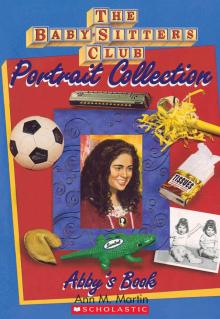 Abby's Book
Abby's Book Karen's Big Top
Karen's Big Top Main Street #8: Special Delivery
Main Street #8: Special Delivery Kristy and the Kidnapper
Kristy and the Kidnapper Karen's Ski Trip
Karen's Ski Trip Karen's Hurricane
Karen's Hurricane Stacey and the Mystery at the Mall
Stacey and the Mystery at the Mall Jessi and the Superbrat
Jessi and the Superbrat Kristy and the Baby Parade
Kristy and the Baby Parade Karen's New Bike
Karen's New Bike Karen's Big City Mystery
Karen's Big City Mystery Baby-Sitters' European Vacation
Baby-Sitters' European Vacation Hello, Mallory
Hello, Mallory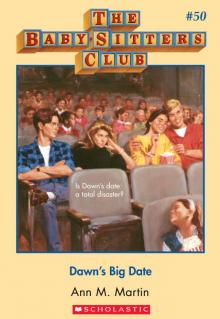 Dawn's Big Date
Dawn's Big Date Karen's Christmas Carol
Karen's Christmas Carol Jessi's Horrible Prank
Jessi's Horrible Prank Kristy and the Missing Fortune
Kristy and the Missing Fortune Kristy and the Haunted Mansion
Kristy and the Haunted Mansion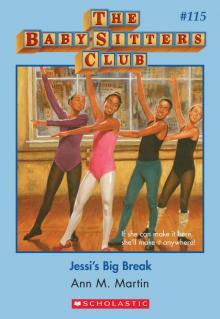 Jessi's Big Break
Jessi's Big Break Karen's Pony
Karen's Pony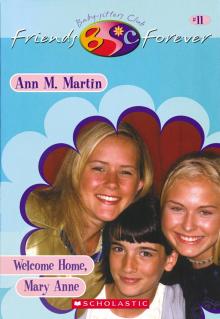 Welcome Home, Mary Anne
Welcome Home, Mary Anne Stacey the Math Whiz
Stacey the Math Whiz September Surprises
September Surprises Bummer Summer
Bummer Summer Karen's Secret
Karen's Secret Abby's Twin
Abby's Twin Main Street #4: Best Friends
Main Street #4: Best Friends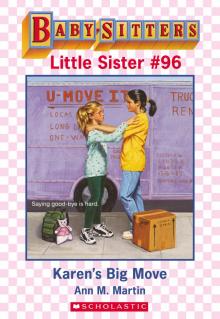 Karen's Big Move
Karen's Big Move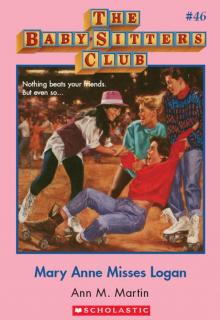 Mary Anne Misses Logan
Mary Anne Misses Logan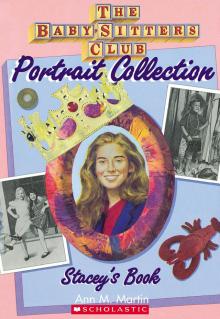 Stacey's Book
Stacey's Book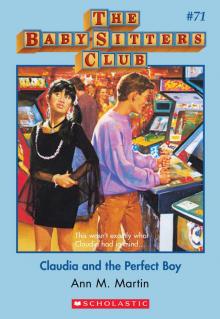 Claudia and the Perfect Boy
Claudia and the Perfect Boy Holiday Time
Holiday Time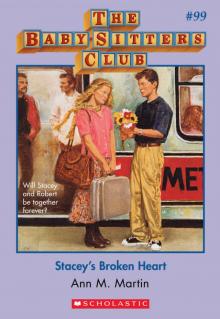 Stacey's Broken Heart
Stacey's Broken Heart Karen's Field Day
Karen's Field Day Kristy's Worst Idea
Kristy's Worst Idea Dawn and the Older Boy
Dawn and the Older Boy Karen's Brothers
Karen's Brothers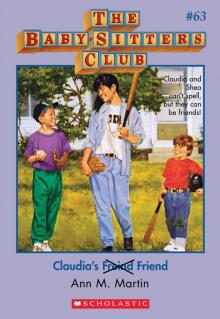 Claudia's Friend
Claudia's Friend Mary Anne and the Haunted Bookstore
Mary Anne and the Haunted Bookstore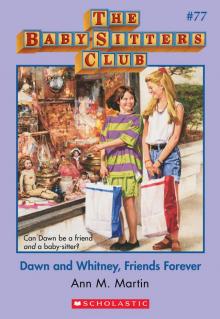 Dawn and Whitney, Friends Forever
Dawn and Whitney, Friends Forever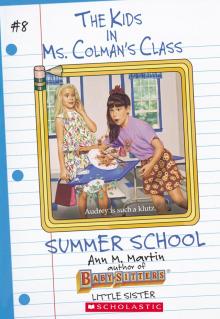 Summer School
Summer School Karen's Birthday
Karen's Birthday Karen's Black Cat
Karen's Black Cat Stacey McGill... Matchmaker?
Stacey McGill... Matchmaker? Claudia's Book
Claudia's Book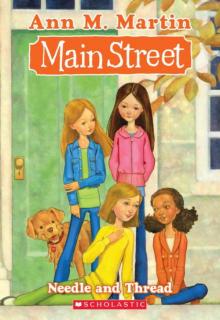 Main Street #2: Needle and Thread
Main Street #2: Needle and Thread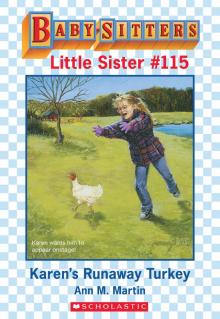 Karen's Runaway Turkey
Karen's Runaway Turkey Karen's Campout
Karen's Campout Karen's Bunny
Karen's Bunny Claudia and the New Girl
Claudia and the New Girl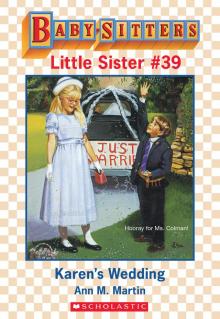 Karen's Wedding
Karen's Wedding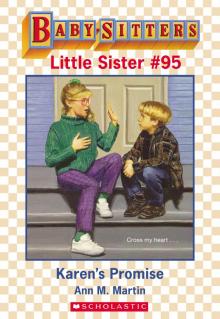 Karen's Promise
Karen's Promise Karen's Snow Princess
Karen's Snow Princess Claudia Kishi, Middle School Dropout
Claudia Kishi, Middle School Dropout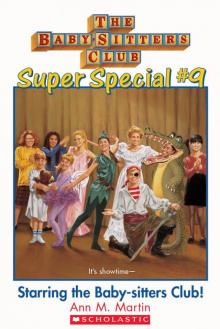 Starring the Baby-Sitters Club!
Starring the Baby-Sitters Club! Kristy for President
Kristy for President California Girls!
California Girls!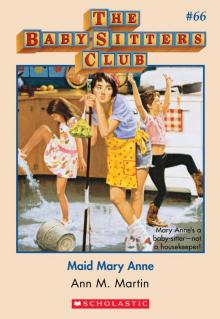 Maid Mary Anne
Maid Mary Anne Abby's Un-Valentine
Abby's Un-Valentine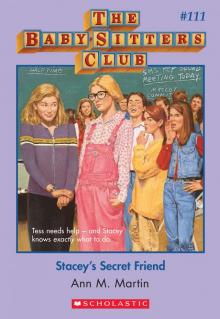 Stacey's Secret Friend
Stacey's Secret Friend Karen's Haunted House
Karen's Haunted House Claudia and Crazy Peaches
Claudia and Crazy Peaches Karen's Prize
Karen's Prize Get Well Soon, Mallory!
Get Well Soon, Mallory! Karen's Doll Hospital
Karen's Doll Hospital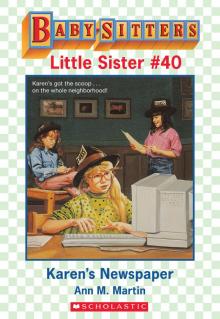 Karen's Newspaper
Karen's Newspaper Karen's Toothache
Karen's Toothache Mary Anne and Miss Priss
Mary Anne and Miss Priss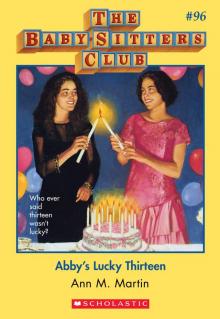 Abby's Lucky Thirteen
Abby's Lucky Thirteen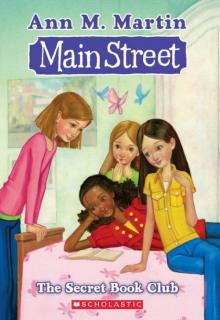 The Secret Book Club
The Secret Book Club The All-New Mallory Pike
The All-New Mallory Pike Karen's Turkey Day
Karen's Turkey Day Karen's Magician
Karen's Magician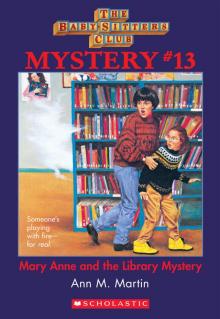 Mary Anne and the Library Mystery
Mary Anne and the Library Mystery Diary One: Dawn, Sunny, Maggie, Amalia, and Ducky
Diary One: Dawn, Sunny, Maggie, Amalia, and Ducky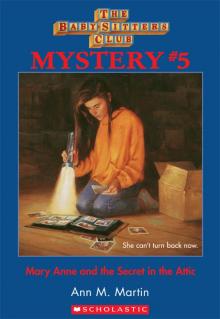 Mary Anne and the Secret in the Attic
Mary Anne and the Secret in the Attic Kristy and the Mother's Day Surprise
Kristy and the Mother's Day Surprise Karen's in Love
Karen's in Love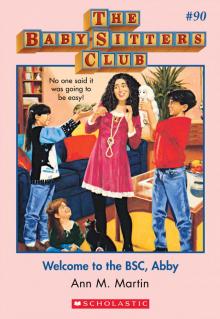 Welcome to the BSC, Abby
Welcome to the BSC, Abby Karen's Kittycat Club
Karen's Kittycat Club The Mystery at Claudia's House
The Mystery at Claudia's House The Truth About Stacey
The Truth About Stacey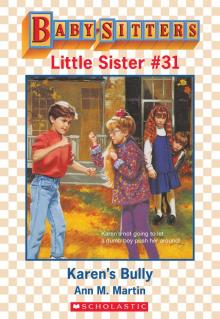 Karen's Bully
Karen's Bully Karen's Gift
Karen's Gift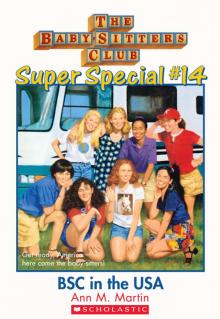 BSC in the USA
BSC in the USA Everything for a Dog
Everything for a Dog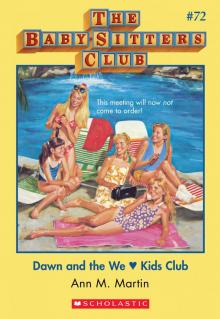 Dawn and the We Love Kids Club
Dawn and the We Love Kids Club Karen's Ghost
Karen's Ghost Stacey's Lie
Stacey's Lie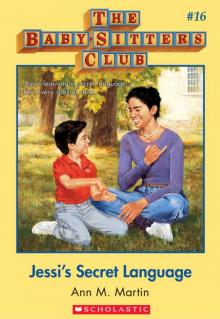 Jessi's Secret Language
Jessi's Secret Language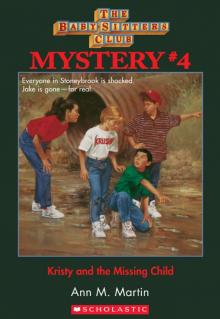 Kristy and the Missing Child
Kristy and the Missing Child Better to Wish
Better to Wish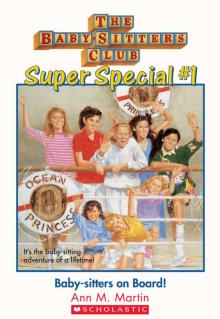 Baby-Sitters on Board!
Baby-Sitters on Board! Kristy at Bat
Kristy at Bat Everything Changes
Everything Changes Don't Give Up, Mallory
Don't Give Up, Mallory A Dog's Life: The Autobiography of a Stray
A Dog's Life: The Autobiography of a Stray Karen's Big Lie
Karen's Big Lie Karen's Show and Share
Karen's Show and Share Mallory Hates Boys (and Gym)
Mallory Hates Boys (and Gym) Diary Two: Dawn, Sunny, Maggie, Amalia, and Ducky
Diary Two: Dawn, Sunny, Maggie, Amalia, and Ducky Karen's Pen Pal
Karen's Pen Pal Claudia and the Friendship Feud
Claudia and the Friendship Feud Karen's Secret Valentine
Karen's Secret Valentine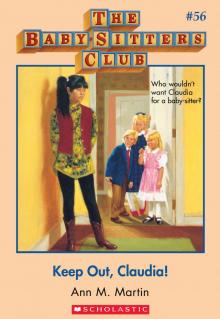 Keep Out, Claudia!
Keep Out, Claudia! Aloha, Baby-Sitters!
Aloha, Baby-Sitters! Welcome Back, Stacey
Welcome Back, Stacey Jessi Ramsey, Pet-Sitter
Jessi Ramsey, Pet-Sitter Karen's Pizza Party
Karen's Pizza Party Kristy and the Dirty Diapers
Kristy and the Dirty Diapers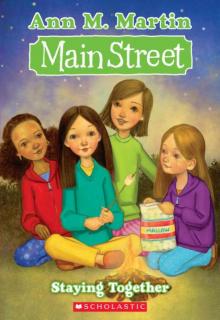 Staying Together
Staying Together Dawn and the Surfer Ghost
Dawn and the Surfer Ghost Claudia Makes Up Her Mind
Claudia Makes Up Her Mind Jessi's Gold Medal
Jessi's Gold Medal Karen's Kite
Karen's Kite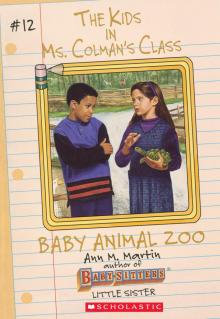 Baby Animal Zoo
Baby Animal Zoo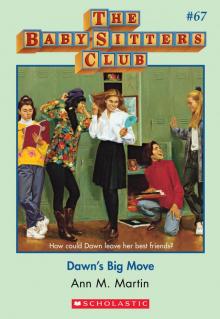 Dawn's Big Move
Dawn's Big Move Karen's Big Joke
Karen's Big Joke Karen's Lemonade Stand
Karen's Lemonade Stand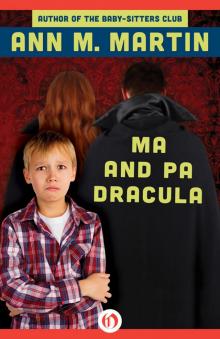 Ma and Pa Dracula
Ma and Pa Dracula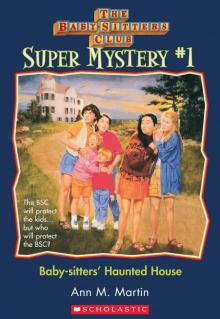 Baby-Sitters' Haunted House
Baby-Sitters' Haunted House Abby and the Mystery Baby
Abby and the Mystery Baby Home Is the Place
Home Is the Place Karen's Grandad
Karen's Grandad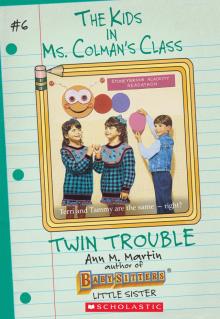 Twin Trouble
Twin Trouble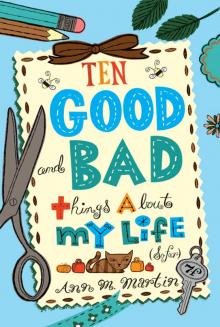 Ten Good and Bad Things About My Life (So Far)
Ten Good and Bad Things About My Life (So Far) Diary Two
Diary Two Baby-Sitters Club 027
Baby-Sitters Club 027 Claudia and the Mystery Painting
Claudia and the Mystery Painting Diary One
Diary One Baby-Sitters Club 037
Baby-Sitters Club 037 Baby-Sitters Club 028
Baby-Sitters Club 028 Baby-Sitters Club 085
Baby-Sitters Club 085 Dawn Schaffer Undercover Baby-Sitter
Dawn Schaffer Undercover Baby-Sitter Jessi's Babysitter
Jessi's Babysitter The Baby-Sitters Club #110: Abby the Bad Sport (Baby-Sitters Club, The)
The Baby-Sitters Club #110: Abby the Bad Sport (Baby-Sitters Club, The) Karen's Little Sister
Karen's Little Sister Baby-Sitters Club 058
Baby-Sitters Club 058 Claudia And The Genius On Elm St.
Claudia And The Genius On Elm St. Missy Piggle-Wiggle and the Sticky-Fingers Cure
Missy Piggle-Wiggle and the Sticky-Fingers Cure Kristy and Kidnapper
Kristy and Kidnapper Baby-Sitters Club 041
Baby-Sitters Club 041 Karen's Bunny Trouble
Karen's Bunny Trouble Baby-Sitters Club 032
Baby-Sitters Club 032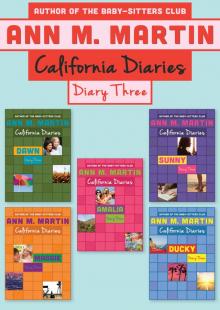 Diary Three
Diary Three Christmas Chiller
Christmas Chiller Karen's Half-Birthday
Karen's Half-Birthday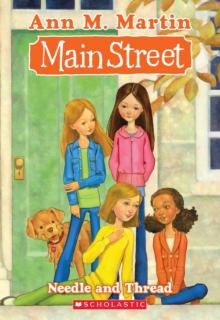 Needle and Thread
Needle and Thread Secret Life of Mary Anne Spier
Secret Life of Mary Anne Spier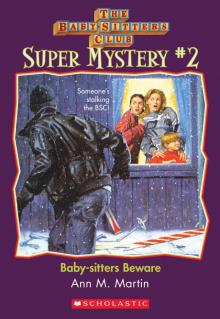 Baby-Sitters Beware
Baby-Sitters Beware Claudia Kishi, Middle School Drop-Out
Claudia Kishi, Middle School Drop-Out Logan Likes Mary Anne !
Logan Likes Mary Anne ! Baby-Sitters Club 061
Baby-Sitters Club 061 Best Friends
Best Friends Baby-Sitters Club 031
Baby-Sitters Club 031 Karen's Little Witch
Karen's Little Witch Jessi Ramsey, Petsitter
Jessi Ramsey, Petsitter Baby-Sitters Club 123
Baby-Sitters Club 123 Baby-Sitters Club 059
Baby-Sitters Club 059 Baby-Sitters Club 033
Baby-Sitters Club 033 Baby-Sitters Club 060
Baby-Sitters Club 060 Baby-Sitters Club 094
Baby-Sitters Club 094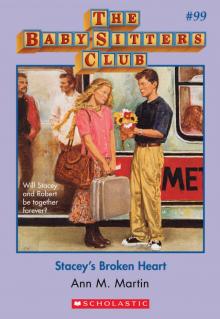 The Baby-Sitters Club #99: Stacey's Broken Heart
The Baby-Sitters Club #99: Stacey's Broken Heart The Baby-Sitters Club #109: Mary Anne to the Rescue (Baby-Sitters Club, The)
The Baby-Sitters Club #109: Mary Anne to the Rescue (Baby-Sitters Club, The) Mystery At Claudia's House
Mystery At Claudia's House Claudia And The Sad Goodbye
Claudia And The Sad Goodbye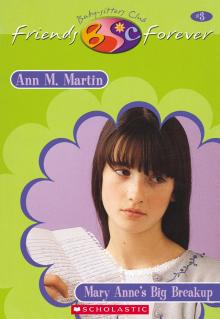 Mary Anne's Big Break-Up
Mary Anne's Big Break-Up Baby-Sitters Club 025
Baby-Sitters Club 025 Baby-Sitters Club 042
Baby-Sitters Club 042 Stacey and the Mystery of the Empty House
Stacey and the Mystery of the Empty House Karen's Baby-Sitter
Karen's Baby-Sitter Claudia's Friendship Feud
Claudia's Friendship Feud Baby-Sitters Club 090
Baby-Sitters Club 090 Baby-Sitters Club 021
Baby-Sitters Club 021 Baby-Sitters Club 056
Baby-Sitters Club 056 Baby-Sitters Club 040
Baby-Sitters Club 040 The Baby-Sitters Club #108: Don't Give Up, Mallory (Baby-Sitters Club, The)
The Baby-Sitters Club #108: Don't Give Up, Mallory (Baby-Sitters Club, The) Dawn and the Impossible Three
Dawn and the Impossible Three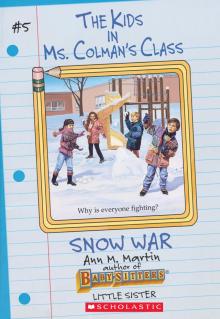 The Snow War
The Snow War Special Delivery
Special Delivery Baby-Sitters Club 057
Baby-Sitters Club 057 Mary Anne And Too Many Babies
Mary Anne And Too Many Babies Baby-Sitters Club 030
Baby-Sitters Club 030